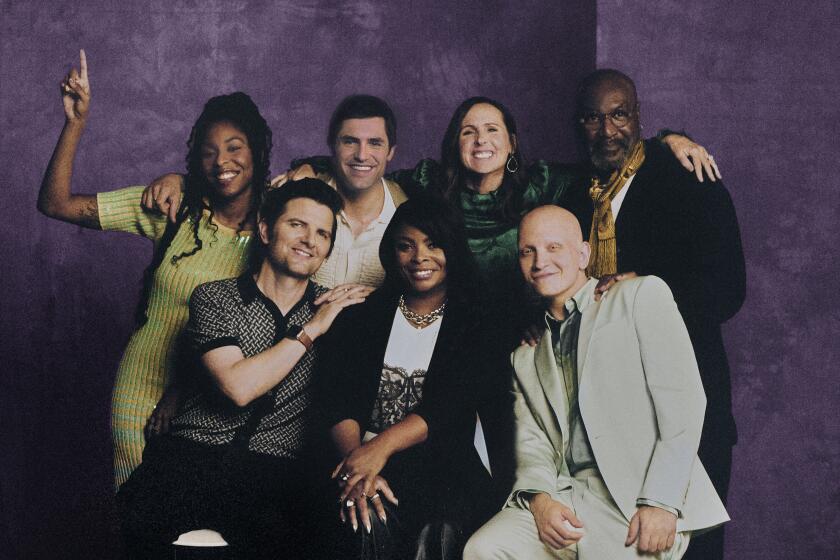Zoe Lister-Jones subverts the male gaze in ‘Slip,’ a new kind of multiverse story

- Share via
If there’s a trailer moment in Roku’s seven-part series “Slip,” it’s when the show’s creator and star, Zoe Lister-Jones, utters the immortal words, “I think my p— is a wormhole.” It may sound like a crude double-entendre, but it’s actually a pretty apt description of the show.
Mae Cannon, played by Lister-Jones, is a New York City art curator in a harmonic but bloodless marriage to a writer (Whitmer Thomas). A one-night stand with a pop star leads to a nightmarish morning-after when he responds to her as if they’re in a long-term relationship. It turns out they are. It turns out she has slipped into an alternative track in the multiverse in which she’s a turbulent, drug-addled celebrity girlfriend. By the end of the day, an encounter in a lesbian bar leads to another orgasm and a new existence as a mom in a same-sex relationship. New sexual encounter, new orgasm, new life.
“A p— as a wormhole is something that I can’t necessarily tell you where it came from. It just came to me one day, and I thought that’s the show I must make. I can make no other show than that,” Lister-Jones says about a series conceived and written during the pandemic, born out of restlessness and contemplation on roads not taken. “It was also born out of me wanting to put a woman’s sexual pleasure at the center of a narrative and finding a way to do that.”
As if writing, producing and directing the entire series over 36 days on the tumultuous streets of New York City wasn’t enough, starring in the show meant appearing nude in numerous scenes and faking orgasm on camera.
“It wasn’t difficult, which maybe speaks to my personal history,” she quips. “I wanted to make sure that we were portraying sex in a way that felt new. I wanted to create sex scenes that could subvert the male gaze. And putting myself in those scenes was a powerful tool to help me support that subversion, because I was subject, object and the puppeteer.”
Growing up in Brooklyn the daughter of fine artists, Lister-Jones was acting professionally by her early 20s, appearing on and off-Broadway and in TV’s “New Girl” and in films such as the Will Ferrell comedy “The Other Guys.” She made her directorial debut with the comedy “Band Aid,” starring Fred Armisen, which was nominated for the grand jury prize at the 2017 Sundance Film Festival. She co-wrote and directed “The Craft: Legacy,” a feminist-themed sequel to the 1990s horror film “The Craft,” and more recently co-starred in director Ari Aster’s “Beau Is Afraid,” starring Joaquin Phoenix.
It’s a résumé that left her well prepared to take on the multiple titles she has for “Slip.” “I really love directing from within scenes,” she says. “It’s so immediate, and you have so many more tools at your disposal as a director to be standing inches away from your scene partner and to be able to not only give direction from within the belly of the beast but to mold the performance. I never felt overwhelmed by it. I felt quite adrenalized by it, always inspired by what was happening in that tornado.”
Our BuzzMeter panel of veteran TV journalists predicts the winners in 14 categories of the 2023(?) Emmys. You can, too, in our weekly polls.
In 2009, she starred in the indie film “Breaking Upwards,” which she co-wrote with writer-director Daryl Wein. The couple went on to make two more films together, “Lola Versus” and “Consumed,” marrying in 2013 and divorcing in 2022.
“I was writing ‘Slip’ as I was going through a separation, so I think a lot of those questions that had been percolating were more at a fever pitch,” she says, reflecting on the process in an April conversation. “It’s not just about my divorce but a sort of larger sense of what home means, so, having the bravery to do something as scary as leaving a relationship that, for all intents and purposes, works, and looking for home in other people. I have a hard time not infusing a lot of my own personal life into my work, even just as an entry point into a story. I tend to start with a question that is confounding me in my life and then find a way in that creates some distance.”
Since the first season was already written on spec, she didn’t need to pitch Roku executives. She simply sent them the material. They said yes and then left her alone to assemble her team and deliver the episodes. A second season hasn’t been greenlighted, but a writers room was assembled and the episodes are already written. In the first season, Mae is a passive protagonist, but in the new season “she has a lot more agency,” Lister-Jones says without revealing any spoilers. “It’s a similar odyssey that is fueled by orgasm, but it’s traveling in a different way, perhaps through time and space.”
She pauses to think of what else she can say without giving too much away, adding only, “It’s pretty bat— crazy.”
Phil Dunster, Janelle James, Adam Scott, Molly Shannon and others reveal the push and pull of being funny on TV
More to Read
From the Oscars to the Emmys.
Get the Envelope newsletter for exclusive awards season coverage, behind-the-scenes stories from the Envelope podcast and columnist Glenn Whipp’s must-read analysis.
You may occasionally receive promotional content from the Los Angeles Times.









